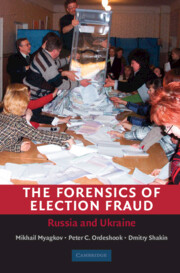1 - A Forensics Approach to Detecting Election Fraud
Published online by Cambridge University Press: 03 February 2010
Summary
[D]emocratic systems have evolved a characteristic solution to the problem of succession to posts of authority … elections.
V. O. Key (1942: 5)The democratic method proposes to instil in public officers a perpetual sense of responsibility to all voters, to all groups, to the whole people. Elections are the necessary condition of this.
W. H. Riker (1965: 84)The accumulation of all powers, legislative, executive and judiciary in the same hands, whether of one, a few or many, and whether hereditary, self appointed, or elective, may justly be pronounced the very definition of tyranny.
James Madison, The Federalist, No. 47FRAUD AND FORENSICS
Neither Key nor Riker, of course, are referring to elections in which an incumbent regime kept opponents off the ballot by the ad hoc manipulation of registration laws, controlled all arms of the media so as to preclude an effective public voice for the opposition, or jailed opponents and harassed voters who support the wrong candidates or parties. Free, fair, and competitive elections are described differently and are universally taken as essential components of a viable democracy. Of course, we appreciate the error of assuming that democracy consists of little more than some idealized notion of an election – of people walking about holding purple fingers in the air to show that they have successfully cast a ballot without being shot, imprisoned, or blown up. As Madison's Federalist, No. 47 warns us, even autocracies can hold elections. A viable democracy requires much more in the way of functioning institutions and processes.
- Type
- Chapter
- Information
- The Forensics of Election FraudRussia and Ukraine, pp. 12 - 29Publisher: Cambridge University PressPrint publication year: 2009
- 1
- Cited by



